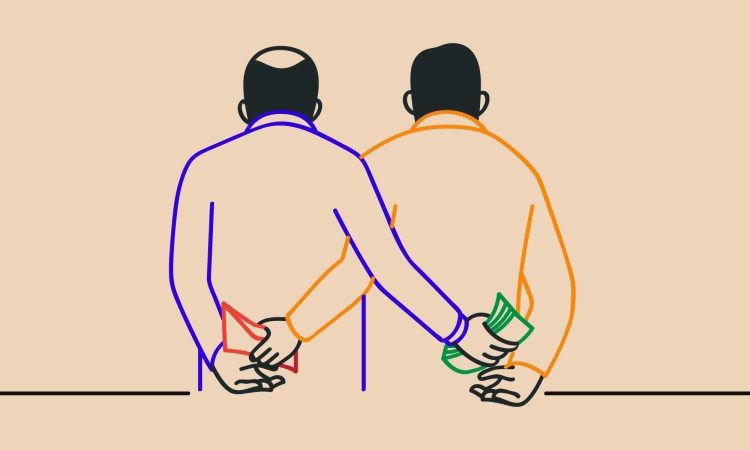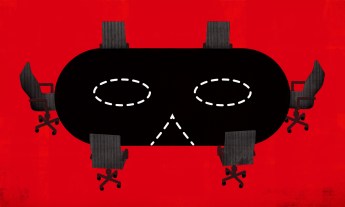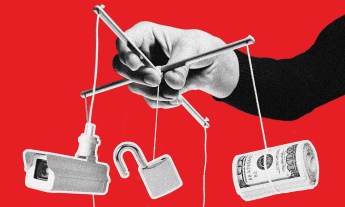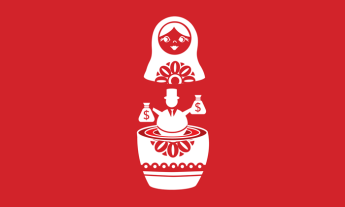
Corruption doesn’t result from a lack of ethics or knowledge; it’s a workaround chosen by people when they have few better options. So what can decrease its lure? New ways to make progress and make money.
Ask citizens why their countries aren’t developing, ask investors why they choose not to invest in some regions, and corruption is almost always at the top of their list of reasons. Hundreds of millions of dollars are spent annually trying to eradicate fraud and graft around the world, yet it’s stubbornly pervasive.
When I (Clayton) was a missionary in South Korea in the 1970s, we were visited monthly by a man selling “safety” insurance. If you paid him, he guaranteed that your home would not be robbed; if you didn’t, somebody picked your house clean. Making sure that our modest possessions were not taken away was important for our survival, so we paid.
It’s only in hindsight that I see we were willing participants in a form of low-grade corruption — the kind that establishes a power balance in a community, makes lives easier (or harder, for those who don’t participate), and keeps the economic wheels of daily life greased. On either side, corruption was, and continues to be, a matter of survival.
A shocking 79 percent of the 7.6 billion people in the world live in countries with “corrupt” governments.
Today, more than two-thirds of the countries measured by global anti-corruption group Transparency International score lower than 50 — out of a possible 100 — on the annual Corruption Perceptions Index. (A score of 0 is seen as very corrupt; 100 is seen as very clean.) The average score worldwide is 43. According to the organization, a shocking 79 percent of the 7.6 billion people in the world live in countries with “corrupt” governments. That’s a lot of us. It’s hard to estimate the negative effect that corruption has on poorer countries, especially when its mere perception impedes investments that can help them create wealth and prosperity.
People in societies where corruption is common are not missing the fundamental moral fiber of those in non-corrupt societies, nor are they simply ignorant that there is a better way. Instead, corruption is a workaround when there are few better options. Corruption is hired for a Job to Be Done, or, more specifically, to help people make progress in a particular circumstance. In fact, our research has found that there are three powerful reasons why people hire corruption.
First, the vast majority of individuals in society want to make progress. From the jobless person looking for employment to the wealthy person looking to gain more status, we want to improve our financial, social and emotional well-being. When society offers few legitimate options to make progress, corruption becomes more attractive.
Second, every individual, just like every company, has a cost structure. In business, a company’s cost structure is the combination of fixed and variable costs it incurs to run its business. Individuals also have a cost structure — how much money they spend to maintain their lifestyle — and it includes rent or mortgage payments, school fees, hospital bills and food. Just like companies, individuals must have revenues that surpass their costs. Understanding this revenue-cost relationship helps predict circumstances where the likelihood of corruption will be high. For example, if a police officer in India earns 20,000 rupees a month (approximately $295) but has a cost structure that demands he spend $400 a month, he will be susceptible to corruption, regardless of what the laws dictate.
Third, people hire corruption because most individuals — regardless of income level — will subvert the law to make progress or benefit themselves. According to Harvard academics Edward Glaeser and Andrei Shleifer, when confronted with a law that limits our ability to do what we want to do, most of us make a mental calculation: Do I need to obey this law, or can I get away with disobeying it? And which way will I be better off? The average rational person will compare the benefits of obeying the law with the consequences of disobedience. If the scale tips toward disobedience, then it is actually irrational for the individual to obey the law, no matter how “good” it might seem.
Development often precedes successful anti-corruption programs, not the other way around.
Consider the fact that so many of us, all over the world, flout the speed limit when there are no police officers or cameras in sight. In the US, the community-based GPS smartphone app Waze allows us to warn each other when a police car is lurking up ahead. This social network-enabled product is dependent on many of us agreeing we should help one another avoid speed traps. We want to make progress — get where we are going quickly — and willingly ignore the people who enforce the legal speed limit because we believe we’re better off making that choice.
Fighting corruption feels like playing a game of Whac-A-Mole. As soon as one corrupt player is vanquished, more pop up in its place. But perhaps the problem just needs to be examined differently. Instead of poor countries continuing to try to fight corruption with their limited resources, what would happen if they focused on enabling the creation of new markets that help citizens solve their everyday problems?
Development often precedes successful anti-corruption programs, not the other way around. Once enough markets are created, people have an interest in those markets succeeding. Governments will generate more revenue to improve their courts, law enforcement, and legislative systems. In addition, markets provide jobs that give people a viable alternative to accumulating wealth through corrupt means.
Anti-corruption was not triggered by legislation or increased law enforcement; it came about because the fundamental equation of how Americans could make money, make progress, and make a living changed.
There was a time when corruption in America rivaled corruption in some of the poorest countries today. It was epitomized by 19th-century politician William Magear “Boss” Tweed. Born in 1823, Tweed entered New York City politics at an early age and was elected city alderman by the time he was 28. After spending several years in the position, he opened a law office even though he was not a lawyer. There, he received payments from corporations for his “legal services,” payments that were mostly extortions. With these funds, Tweed purchased Manhattan real estate and further grew his influence.
“The Tweed ring at its height was an engineering marvel, strong and solid, strategically deployed to control key power points: the courts, the legislature, the treasury and the ballot box,” biographer Kenneth Ackerman wrote. “Its frauds had a grandeur of scale and an elegance of structure: money laundering, profit sharing and organization.” During his time as the boss of Tammany Hall, Tweed — briefly a member of the US House of Representatives — stole a sum estimated to be between $1 billion and $4 billion in today’s dollars.
Although the railroads in the 1800s and the roads in the 1900s were good for America, they also brought with them an unprecedented level of corruption. When the US government got into the business of railroads, it extended subsidies to contractors; the subsidies were often based on the number of miles of railroad tracks built, not on the quality or effectiveness of the tracks. Predictably, some contractors built long and winding railroads with subpar material. Similar fraud occurred with the automobile boom in the early part of the 2oth century. Thomas MacDonald, then-administrator of the US Federal Highway Administration, “visited road construction jobs where he found waste and shoddy work in abundance,” Earl Swift notes in his book The Big Roads. “Localities often got about a dime’s worth of road for every dollar they spent … contractors had carved the state among themselves so that each would be assured all the bridge work in a particular territory, an arrangement that cost taxpayers twice in contracts that were wildly overpriced.”
Had Transparency International’s rankings existed back then, the US would not have been high on the list of “least corrupt” countries. But it improved over time. Was that due primarily to better laws, better politicians or better institutions? These certainly all helped, but they didn’t cause America to suddenly stop being corrupt.
Corruption for most people is simply a means to an end. If they had an alternative, most would not choose to hire corruption to make progress.
As more and more Americans created more and more wealth for themselves and found better ways to make a living, their voices of dissatisfaction with corruption became louder. “Politically, the rage of victims counted for very little in 1840, not much in 1860; by 1890, it was a roaring force” is how Stanford Law professor Lawrence Friedman put it. In the US, development happened in spite of the widespread corruption and unpredictability. Anti-corruption was not triggered by legislation or an increased intensity in law enforcement; it came about because the fundamental equation of how Americans — whether average or rich — could make money, make progress, and make a living for themselves and their families changed.
When a better way presents itself, the process that leads to transparency begins. We can see this happening in countries all over the world. In the late 1940s, for instance, Taiwan was quite corrupt and unpredictable. Mayors and local public officials handed out favors to their cronies and lined their own pockets in the process, and many forms of corruption, such as bribery, embezzlement, nepotism and organized crime, went unchecked. Taiwan, however, has since become a successful and productive economy, and ranks high — 29th — out of the 180 countries in the Corruption Perceptions Index.
Corruption for most people is simply a means to an end. If they had an alternative, most would not choose to hire corruption to make progress. Short of enforcing morality — often an expensive and difficult strategy with mixed results — we cannot think of a better strategy for curbing corruption than the creation of new markets.
Consider what happened in the music industry in America at the turn of this century, when a culture of piracy and illegal music sharing gave way to one in which customers opted to pay for streaming music instead. If you’re old enough to remember the golden age of the mixtape, you will remember that after the innovation of a dual-cassette recorder, copying music was easy. Many of us made mixtapes for parties, mixtapes to share with girlfriends or boyfriends, mixtapes for road trips.
Music industry executives spent years lobbying Congress for stricter copyright protections and millions of dollars in awareness campaigns designed to deter people from “stealing” music this way. But none of that made a dent in the practice of making copies. America had become a nation of thieves who stole music.
We might win cases against corrupt politicians and corrupt practices, but until we understand why people hire corruption, we’ll continue to spend hard-earned resources fighting this problem.
Few people outside the music industry seemed to care, and things only got worse for the music industry with the invention of Napster. Suddenly, people all around the world could share their music — all of it, anytime, with anyone. And they did, indiscriminately. The situation got so big that the music industry took Napster to court, and the industry won. Napster shut down its operations, eventually declaring bankruptcy.
Although the music industry won the battle, illegal sharing just went further underground. In a confessional book titled How Music Got Free, journalist Stephen Witt chronicles his foray into the world of music piracy and his eventual change of heart. He did not stop stealing music because he had a moral revelation. Rather, Witt threw in the towel in 2014 because it was simply not worth the trouble.
“Using Spotify for the first time, I immediately understood that the corporations had won — its scope and convenience made torrenting music seem antique,” he writes. “For the first time, a legal business was offering a product that was superior to what was available underground.”
The music industry might have been able to knock down music pirates here and there. But until it truly understood why people were “hiring” those alternative solutions, it was never going to prevail. It was playing its own game of Whac-A-Mole.
Were the agents in South Korea demanding that I pay “safety insurance” 40 years ago corrupt? Yes. What about the police officers in impoverished countries who take bribes? Absolutely. Are these people engaging in corruption because they are morally bankrupt individuals? No. For them and the music “thieves” and the Waze speed-trap avoiders, corruption is a solution to a struggle. It’s often the most cost-effective way for people to make progress in their societies. Simply enacting new laws or harsher penalties isn’t necessarily going to make them change their behavior. It just drives the corruption underground. The same is true throughout society. We might win cases against shady politicians and practices, but until we understand why people hire corruption, we’ll continue to spend hard-earned resources fighting this problem.
Of course, the world shouldn’t turn a blind eye and wait for economic growth to push aside fraud and graft. But if we want to have a fighting chance against corruption, we can complement existing efforts with market-creating innovations. We’re not saying that corruption can be completely eradicated from any society — corruption still exists in the US and in every other nation — but it can be significantly mitigated. And this matters to a society’s potential for growth, because limiting corruption leads to predictability, which improves trust and transparency.
Adapted from the new book The Prosperity Paradox: How Innovation Can Lift Nations Out of Poverty by Clayton Christensen, Efosa Ojomo and Karen Dillon. Reprinted with permission from Harper Business, an imprint of HarperCollins Publishers. Copyright © 2019 by Clayton M. Christensen, Efosa Ojoma and Karen Dillon.
Watch Clayton Christensen’s TEDxBoston talk here:
Watch Efosa Ojomo’s TEDxGaborone talk here:












